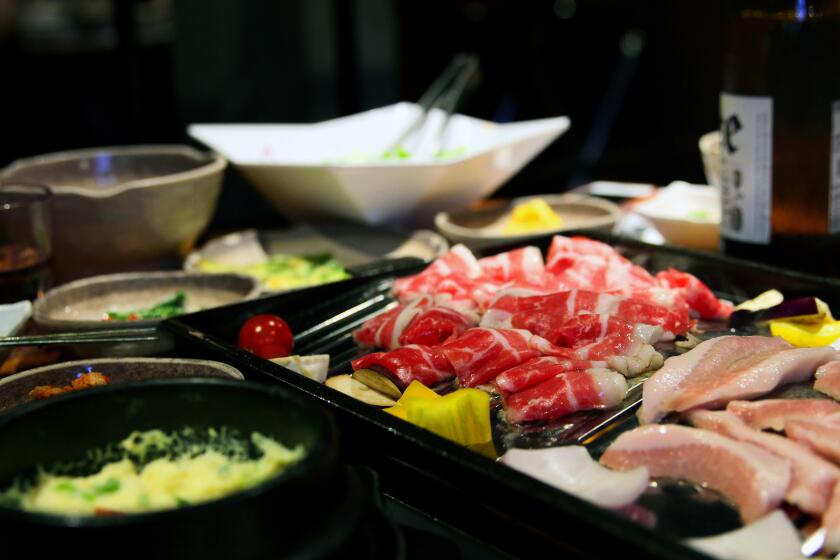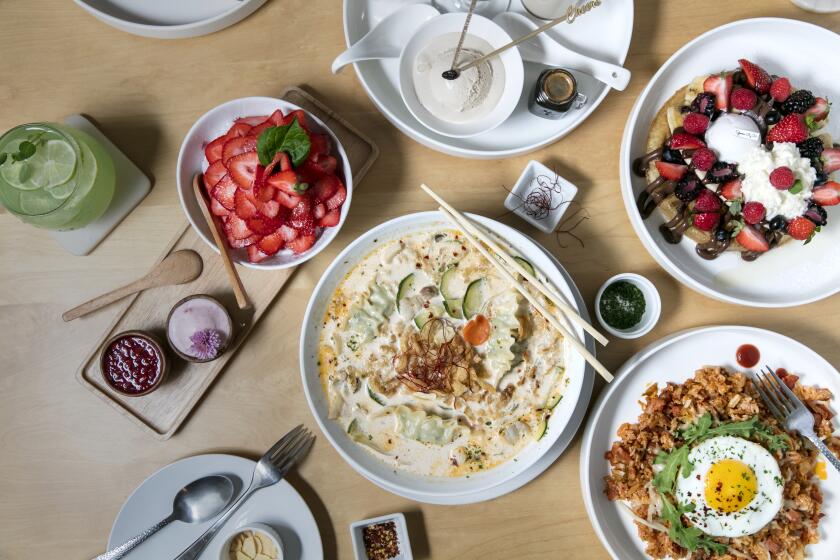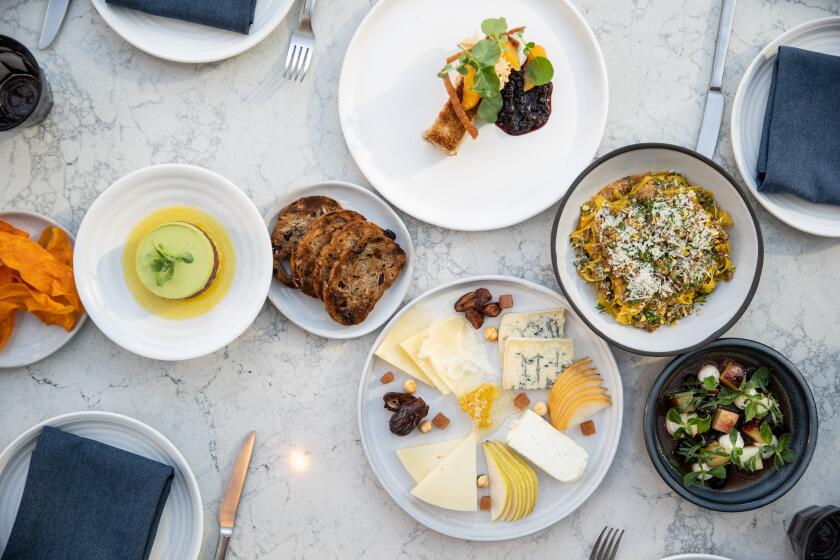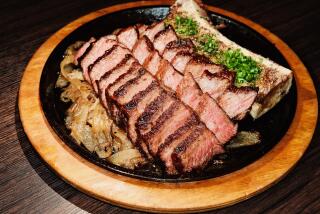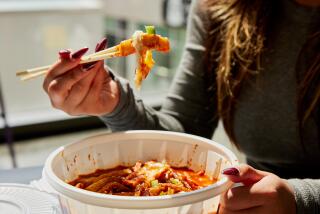Review: This is the place to try Korean BBQ with dry-aged beef
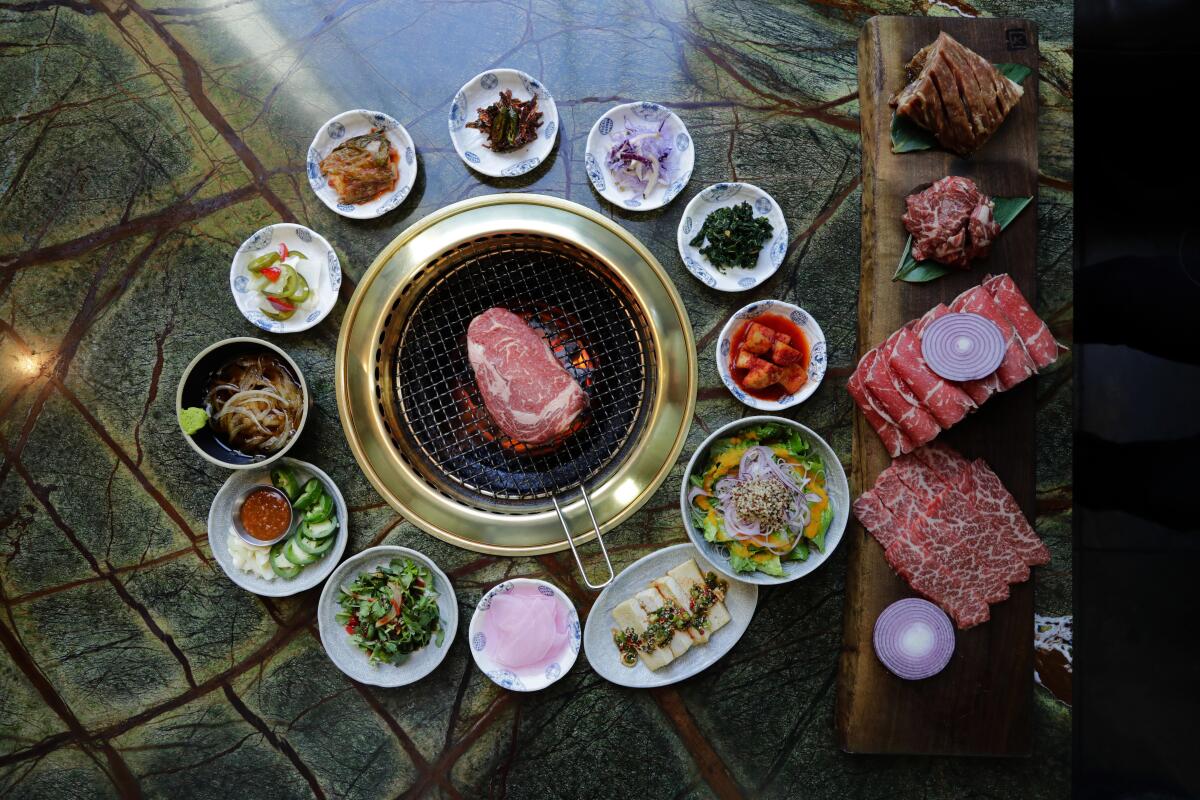
Among the dozens of Korean barbecue restaurants packed into Koreatown’s 2.7 square miles, how might an ambitious new entrant distinguish itself?
Jeong Yuk Jeom, located on the first floor of MaDang mall (above H Mart), brings the visual drama. Its ground level is a lavish, cavernous squandering of space filled with stone tiles, gray brick and mixed accent woods. A bar with counter seating stretches across one wall, though customers only occasionally settle there to drink. Ditto the central communal table, which tends to sit empty.
Mainly the space frames a long, theatrical ramp lined with green runway lights; walk under enormous beams made from birch and zelkova, brought over from a dismantled temple in China and flanked by walls of glass shelves lined with glowing bottles of soju. The main dining room, with its wafts of grilling meat, awaits on the other side — as do goofy signs sporting slogans such as “There is no sincerer love than the love of meat,” which contrast with the design’s elegance.
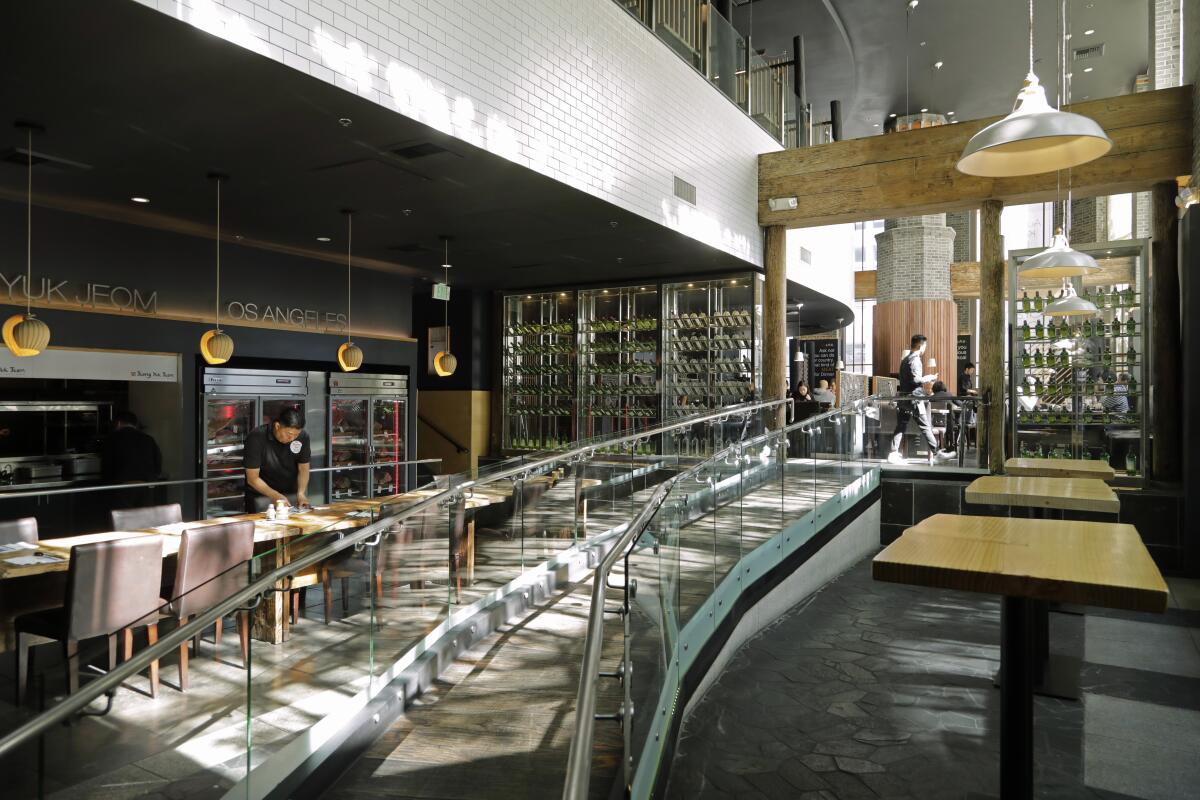
Jeong Yuk Jeom (the name translates as “butcher shop”) also differentiates itself by featuring prime-grade beef, including pricier dry-aged cuts. The owners, brothers Andrew and Jaeyong Son, are competing against the likes of Parks BBQ and Gwang Yang BBQ, tonier local stalwarts whose draws are attentive service and high-quality meats.
The Sons previously operated two New York metro-area locations of Kang Ho-Dong Baekjeong, the Seoul-based franchise with a local Koreatown outpost where waits for a table can run an hour or longer.
Jeong Yuk Jeom opened in August 2018. It attracts steady crowds, though queues are rarely lengthy. (One fast-track option: Add your name to a wait list via Yelp.) The restaurant hasn’t yet reached zeitgeist status, perhaps due to the price — it’s in the upper cost tiers for Korean barbecue restaurants — and uneven levels of hospitality.
Where to find the best restaurants, bars, spas, shopping and more.
Twelve cuts of beef anchor the menu. Order one of three “butcher’s pride” options — feasts designed for two, three or four people — to minimize decisions and get right to the action. A spread for four of us included ribbons of brisket, three variations on boneless short rib (unseasoned, lightly seasoned and in a garlicky soy marinade) and a wet-aged rib-eye steak.
The meats arrived, one more richly marbled than the next, on a polished wooden board that sat off to the side while the inset table grill fired up and servers filled the table with classic banchan: several varieties of kimchi (the leaves of the cabbage kimchi particularly delicate and appealingly spicy-fizzy on the palate); round slices of pickled daikon, thin as veils; creamy celery salad.
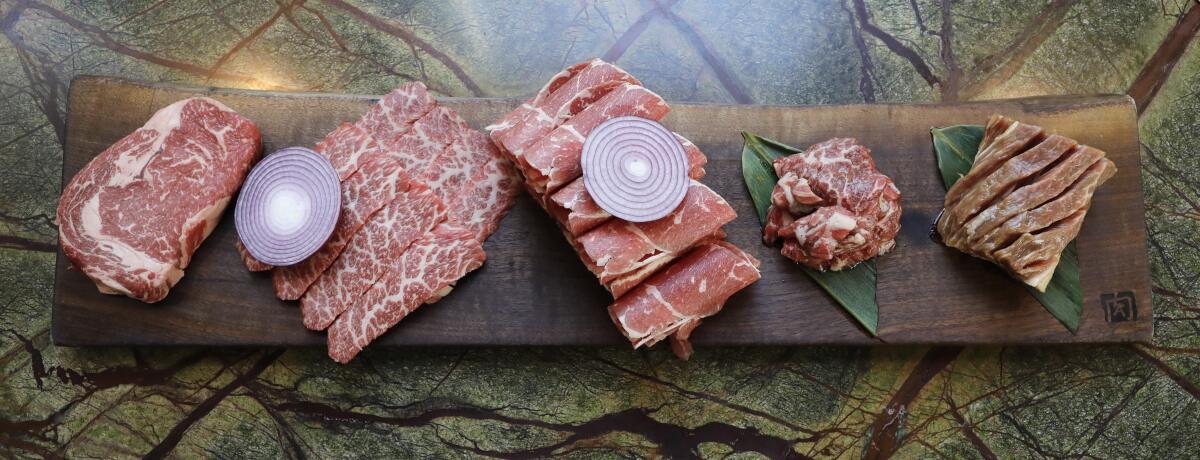
The grill’s gas burner ignited compressed cubes of binchotan, which paled from black to ashy white as it heated. At many Korean barbecue restaurants, the cooking is done by diners or is a clear collaboration with staff. Servers here took turns cooking the meats; whoever was passing by the table surveyed the progress and jumped in, turning hunks with tongs or snipping them into pieces with scissors. We snatched the meats while they were still rosy. First came the wispy sheets of brisket, which curled and caramelized quickly. Its fat melted and dribbled. Flames surged.
Critic Bill Addison reviews Spoon by H, a Beverly Boulevard cafe made famous by David Chang for its Korean soups and fried rice.
The brisket proved decent; everything else after it was far more gratifying. Short rib was an easy-to-pound-down expression of supple chew and meaty intensity; the unadorned version, with nothing distracting from the smoke and char and beefiness, proved the most satisfying.
Three condiments came with the meat: a soy-based dip, spicy-sweet gochujang and the one we were most encouraged to use, plain salt. Lightly pickled vegetables and dressed herbs landed on the table but none of the lettuce leaves or rice paper often provided for wrapping.
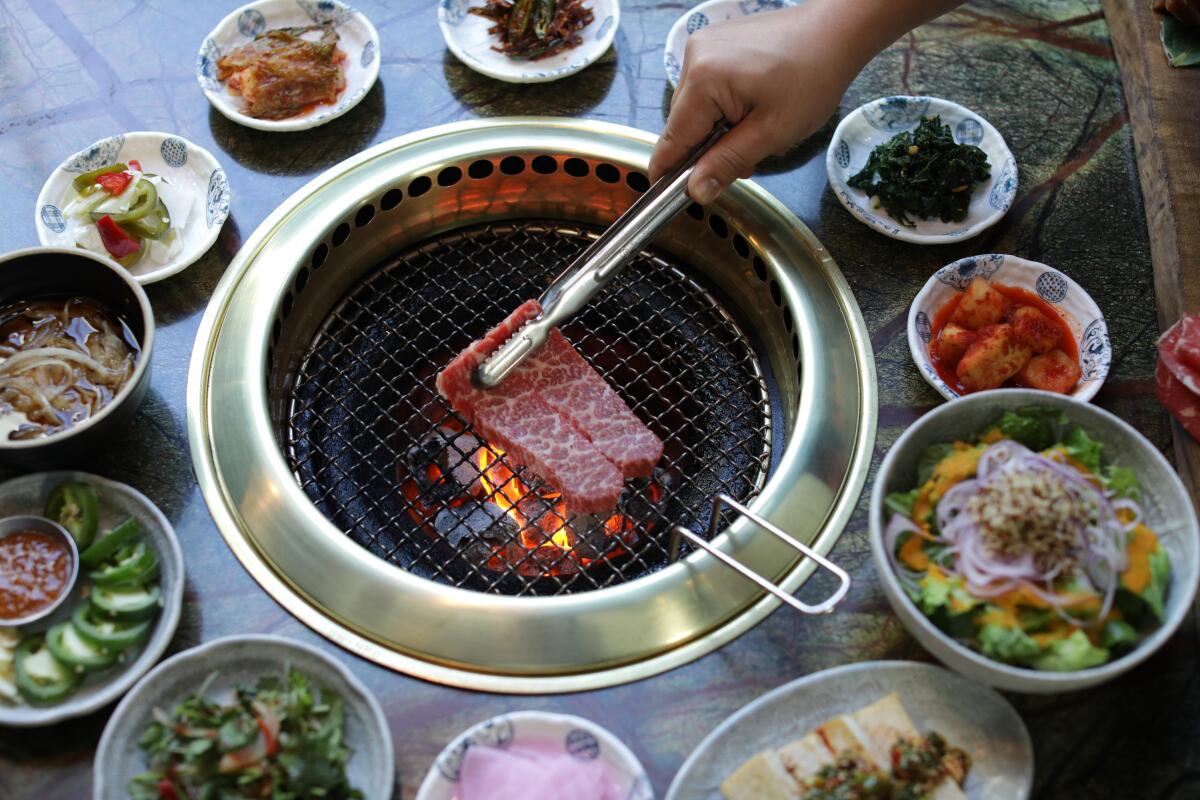
Dry-aged meats have been inching into the Korean barbecue lexicon across the nation lately. Manhattan’s Cote, a blockbuster success that crossbred the Korean barbecue restaurant with the American steakhouse, dry-ages meat in a glassed-in chamber in its basement, bathed in red light for vampiric glamour. I see Cote’s influence in Jeong Yuk Jeom’s high-status aspirations — and in the small cabinet in its vast entry room stocked with a sample display of the restaurant’s beef inventory, doused in the same crimson lighting.
I wish Jeong Yuk Jeom wasn’t quite so tame with its dry-aging methods: The steaks, for their stated 60 days of maturation, were still surprisingly clammy before they’re cooked; only when I was chomping forthrightly on the fat after grilling did any of the telltale funk register on my taste buds. Otherwise the meat delivered lushness but the flavor was mild. The $49 dry-aged prime rib-eye is probably the way to go if you’re curious. Unless you’re on an expense account impressing clients, you can skip the $190 dry-aged tomahawk steak, in which some full-force blue-cheesy depth would be welcome.
Critic Patricia Escárcega reviews Openaire, the stylish greenhouse restaurant overseen by Josiah Citrin at the Line Hotel in Koreatown.
Service drifted in and out of attentiveness during a couple of recent dinners. It was hard to grab someone’s attention to order our meal, even after ringing the table buzzer to alert the staff. Here the servers give the impression that they’ll be graciously tending the fire, and then they’ll be unexpectedly distracted and suddenly you’re scrambling to pull nearly overcooked meat from the grill. One server replaced a dry-aged rib-eye when he saw he’d forgotten his duties and the steak was scorched to gray. Keep the tongs close.
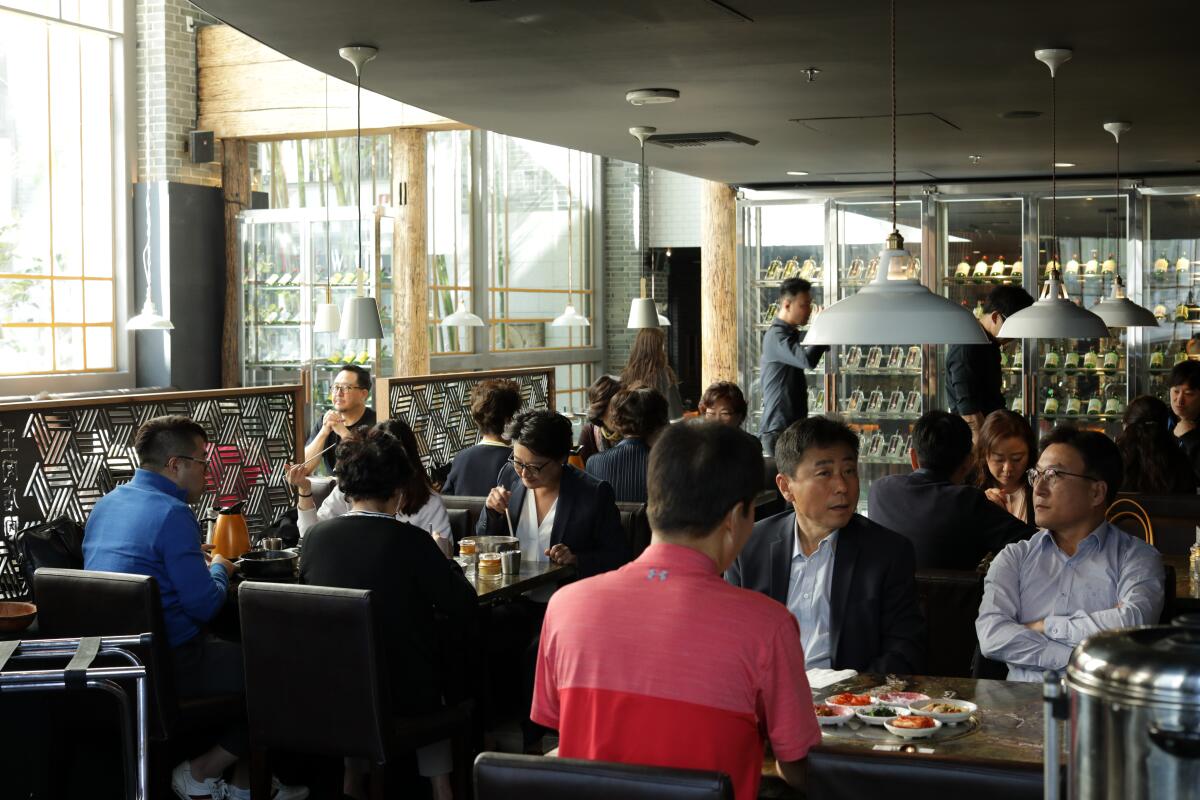
A gamut of Korean staple dishes fills out the menu. Competent renderings of haemul pajeon (crisp seafood pancake), roiling sundubu-jjigae and generous short-rib soup won’t replace favorite versions at other restaurants but they’ll round out the meal and quell hankerings.
Don’t be too distracted though. When the service finds its rhythm, when the charcoal is white-hot, the pleasure of quality beef is obvious and Jeong Yuk Jeom falls into place as a fine, stunningly designed addition to Ktown’s meat palaces.
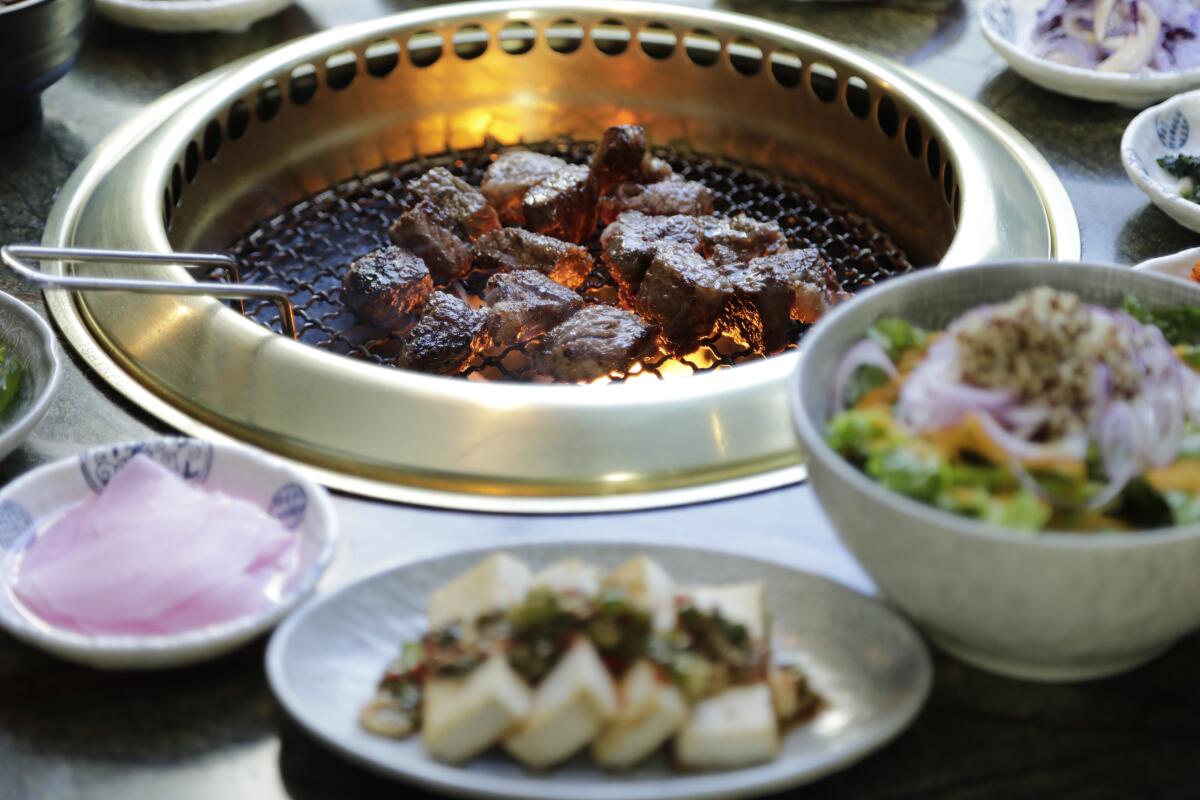
Jeong Yuk Jeom
Location: 621 S. Western Ave., Los Angeles, (213) 384-2244, jeongyukjeom.com
Prices: Meats $28-$190; combination meat dinners $80-$150; appetizers $8-$28; soups and noodle dishes $7-$29.
Details: Credit cards accepted. Full bar. Lot and street parking. Wheelchair accessible.
Recommended dishes: Dry-aged prime rib-eye, prime , Butcher’s Pride combinations, seafood pancake.
More to Read
Eat your way across L.A.
Get our weekly Tasting Notes newsletter for reviews, news and more.
You may occasionally receive promotional content from the Los Angeles Times.
